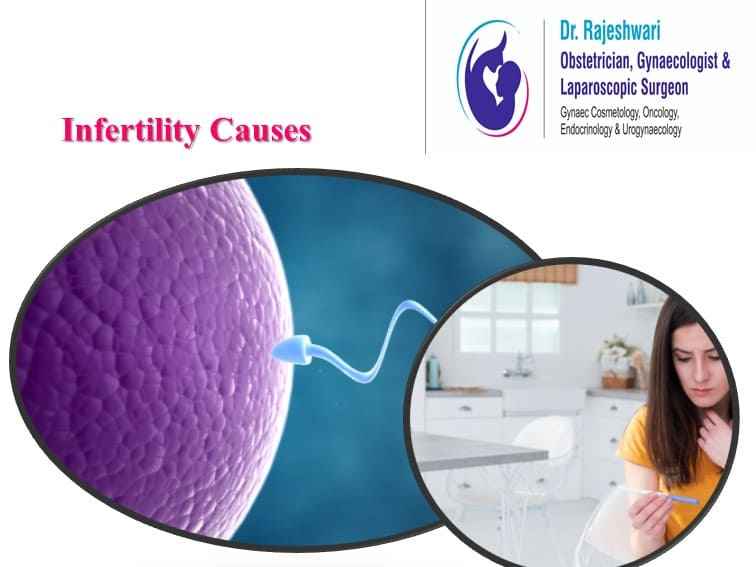Around 15% of married couples and women – after years of attempts have problems getting pregnant even after continuous unprotected intercourse. The causes of infertility in women are many. Doctors try to detect and diagnose the underlying cause of infertility in one or both partners depending on the circumstances and individual cases. If they find certain factors responsible for infertility, then they perform more detailed, comprehensive investigations. Depending on the cause of infertility, there is a wide range of treatment options.
Symptoms of Infertility
Signs of infertility in women: There are no obvious symptoms of infertility. The inability to conceive is the most common sign of infertility. A woman may not ovulate if her menstrual cycle is irregular, or missing (absent) altogether.
Causes of Infertility in Women
- Hormonal issues– You may not be able to conceive if your body doesn’t undergo the normal hormonal changes that are required for the production of an ovum from the ovary and the thickening of the uterine lining. Excess prolactin hormone (hyperprolactinemia) may also interfere with ovulation. Hypothyroidism and hyperthyroidism can affect menstruation and cause infertility.
- Cervical issues– Some females have a disease that makes it difficult for sperm to enter through the cervical canal (cervical canal atresia).
- Fallopian tubes damage– These tubes transport fertilized ovum from your ovaries to the uterus, where the baby grows. Vaginal infections, endometriosis, PID, and pelvic surgeries can cause damage to the tubes. This can make it difficult for sperm to reach an egg in the fallopian tube. In the tube, the sperm and egg fertilize prior to being sent to the uterus for implantation.
- Having problems with your uterus – Fibroids and polyps may prevent women from conceiving. Fibroids that grow in the uterine wall can affect fertility.
- Pelvic adhesions: Bands of scar tissues are formed after pelvic infection and endometriosis. These tissues or bands of scar attach organs and bind them. In addition, pelvic adhesions can also form after appendicitis and pelvic surgery and cause infertility in women.
- Ovulation disorders – The majority of cases of infertility are caused by irregular ovulation or no ovulation at all. Ovulation abnormalities can be caused by issues with the hypothalamus or pituitary gland’s management of estrogen and progesterone, as well as issues with the ovary. Excess work – too much indulgence in exercise and eating disorders can also affect a woman’s fertility. Ovulation disorders are one of the major causes of infertility in women
- Dysfunction of the pituitary– The pituitary gland produces two chemicals that stimulate ovulation each month: luteinizing hormone (LH) and follicle-stimulating hormone (FSH). Excessive emotional or physical tension, extreme weight gain or reduction, or a recent significant weight loss or gain can all alter hormone levels and impact ovulation. The most prevalent symptoms are irregular or nonexistent menstruation.
- Polycystic ovarian syndrome (PCOS) – PCOS results in a hormonal change that interferes with ovulation. PCOS is linked to insulin resistance, overweight, abnormal facial and body hair growth, and acne. It’s the most prevalent trigger of infertility in women in India.
- Primary ovarian insufficiency – It is a condition in which the ovary does not function properly. Premature ovarian failure, also known as autoimmune ovarian failure, is triggered by an autoimmune response or the early loss of eggs from your ovary, which can be caused by genes or chemotherapy. In women under the age of 40, the ovary no longer makes eggs and estrogen secretion is reduced.
- There’s too much prolactin in your system – Excess prolactin secretion (hyperprolactinemia) by the pituitary gland lowers estrogen levels and can lead to infertility. It’s also possible that medicines you’re taking for another ailment are causing this problem.
- Unexplained infertility – The cause of infertility, sometimes may never be diagnosed. Unexpected reproductive issues could be caused by a combination of several abnormalities in both couples. In such cases, couples may feel annoyed and disturbed if they get no precise response, but the issue may resolve by itself. Infertility treatment, should not be stopped.
Risk Factors for Infertility
- Advancing age
- Smoking
- Sexually transmitted diseases (STIs)
- obesity
- Alcohol consumption
Prevention of Infertility
- Stop smoking– Tobacco has a number of detrimental impacts on fertility, overall health, and the health of a baby. If you’re thinking about starting a family, then quit smoking.
- Avoid consuming alcoholic beverages – Heavy drinking can lead to infertility. And consumption of alcohol in any amount during pregnancy can have a negative impact on the fetus’s wellbeing. Stay away from alcohol if you’re planning to become a mother, and never consume alcohol when you’re pregnant.
- Reduce your stress levels – According to some research studies, stress might lead to couples having less success with infertility treatment. Before attempting to conceive, try to lower your stress levels.
- Maintain a healthy body mass index (BMI) – Ovulation difficulties are more common in overweight and skinny women. Moderate activity is recommended if you need to lose some weight. Ovulation has been linked to strenuous, intensive activity for more than 5 hours per week.
Bottom Line
Around one-quarter of infertility concerns in couples are caused by ovulation disorders. A woman’s period (menstrual cycle) may be inconsistent or nonexistent, indicating that she is not ovulating. Contact your doctor as soon as possible if you notice these symptoms. Your gynecologist who specializes in infertility diagnosis and treatment evaluates all the potential factors contributing to infertility in both partners. She will recommend basic Infertility Evaluation (Testing).
Learn more about Infertility Basic Evaluation
Even after evaluating every single factor and extensive investigations, if no cause is found – still, in many cases, infertility can be successfully treated. Meet me if you have any concerns regarding your infertility issues.
Call: 99636 89895





